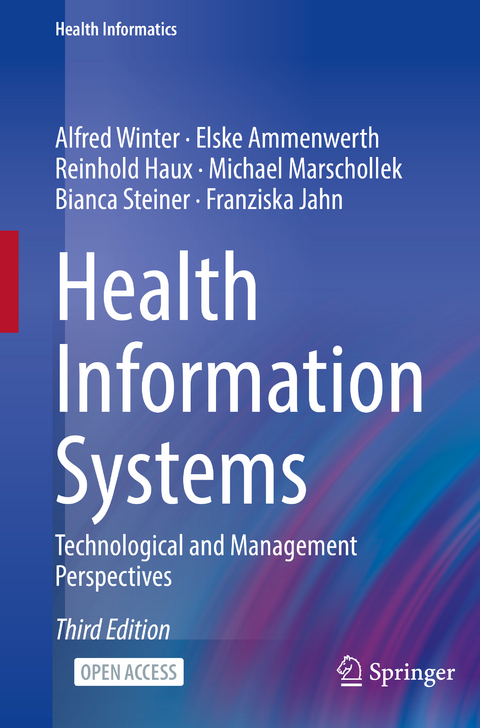
Health Information Systems
Springer International Publishing (Verlag)
978-3-031-12312-2 (ISBN)
This heavily revised open access edition provides a thorough overview of the technologies available to assemble, manage and assess the quality of health information systems. It details a variety of scenarios in the context of both health and heath care, including where prevention and wellness are related, such as the treatment of both acute and chronic diseases. Stakeholder requirements are also described to provide perspectives for describing the architectures and management techniques associated with health information systems, enabling the reader to develop a detailed holistic overview of the subject.
Health Information Systems: Technological and Management Perspectives features a detailed overview of how information systems in health care can be managed and is a vital resource for medical informatics students seeking an up-to-date text on the topic.
Alfred Winter is a professor of medical informatics at the Institute of Medical Informatics, Statistics and Epidemiology at Leipzig University, Germany. For many years, he was responsible for the strategic management of the information system at Leipzig University Medical Center and led numerous projects in tactical information management. He studied computer science at RWTH Aachen University in Aachen, Germany, and received his Ph.D. and a license for lecturing (German "Habilitation") for medical informatics from the Faculty of Theoretical Medicine at the University of Heidelberg. Dr. Winter's research focuses on methods and modeling tools for the management of health information systems and on the integration of information systems for patient care and research. He teaches architectures and management of health information systems in a medical informatics master's course at Leipzig University and as part of the international Frank - van Swieten Lectures on strategic information management. He has been a member of the board of the German Society for Medical Informatics, Biometry and Epidemiology (GMDS) since 2005 and was its president in 2020 and 2021. At the European level, he has been a member of the board and secretary of the European Federation of Medical Informatics (EFMI) since 2014. He is also a member of the editorial board of several international journals and was editor of the German journal GMS Medical Informatics, Biometry and Epidemiology (MIBE) from 2010 to 2020. He is an elected member of the International Academy of Health Sciences Informatics. Elske Ammenwerth is a professor of health informatics and head of the Institute of Medical Informatics at the Private University for Health Sciences, Medical Informatics and Technology (UMIT TIROL) in Hall in Tirol, Austria. She studied medical informatics at the University of Heidelberg/University of Applied Sciences Heilbronn, Germany, and received her Ph.D. from the Medical Faculty of the University of Heidelberg. Her current research fields comprise health information systems, evidence-based health informatics, and patient-centered health information systems. She has authored or coauthored more than 400 scientific papers. Dr. Ammenwerth is the Austrian representative at the European Federation for Medical Informatics (EFMI) and at the International Medical Informatics Association (IMIA). She is an elected member of the International Academy of Health Sciences Informatics. Reinhold Haux is a professor for of medical informatics at the Peter L. Reichertz Institute for Medical Informatics of TU Braunschweig and Hannover Medical School, Germany. From 2007 to 2017 he served as executive director of this institute. He studied medical informatics at the University of Heidelberg/University of Applied Sciences Heilbronn, Germany, where he graduated with a M.Sc. degree (German "Diplom") in 1978. He received a Ph.D. from the Faculty for Theoretical Medicine at the University of Ulm in 1983 and a postdoctoral lecture qualification (German "Habilitation") for medical informatics and statistics from the Medical Faculty of RWTH Aachen University in 1987. Dr. Haux's current research fields are health-enabling technologies, health information systems and management, medical data management, and synergy and intelligence: extended interaction of living and non-living entities. The international Frank - van Swieten Lectures on strategic information management in health information systems have been part of his teaching activities since their start in 2001. He has been chairperson or member of information management boards at various hospitals in Germany and Austria. For the term from 2007 to 2010 he was president of the International Medical Informatics Association (IMIA), an NGO of the World Health Organization. From 2001 to 2015 he was editor of the journal Methods of Information in Medicine. He coedited the IMIA Yearbook of Medical Informatics from 2001 to 2007. Dr. Haux is an elected member of the Braunschweig Scientific Society and of the International Academy of Health Sciences Informatics, where he served as president from 2018 to 2020. Michael Marschollek is a professor of medical informatics and executive director of the Peter L. Reichertz Institute for Medical Informatics of TU Braunschweig and Hannover Medical School, Germany. He studied medicine at Hannover Medical School and computer science at TU Braunschweig, both in Germany, and received an M.D. and a doctoral degree in engineering. His current research fields include wearable sensors and clinical applications of health-enabling technologies, secondary use of clinical data, data mining in medicine, technologies for semantic modeling of clinical data, and sensor-based activity analysis. He is an elected member of the International Academy of Health Sciences Informatics and of the Braunschweig Scientific Society. Dr. Marschollek teaches medical informatics for medical students and biomedical data science in a master's program for physicians and life sciences students at Hannover Medical School. Bianca Steiner is a research associate / project manager at the German Foundation for the Chronically Ill in Berlin, Germany. She works on various projects focusing on innovations in health care and manages a nationwide quality assurance measure for the quality documentation of recording vital parameters through implanted devices. She studied medical informatics at TU Braunschweig, Germany. Between 2015 and 2021 she worked as a research associate at the Peter L. Reichertz Institute for Medical Information of TU Braunschweig and Hannover Medical School, focusing on intersectoral care processes and health-enabling technologies in the field of rehabilitation. In 2021 she received her Ph.D. from the Carl-Friedrich-Gauss-Faculty at TU Braunschweig for her work on increasing therapy adherence in rehabilitation through gamification. Dr. Steiner taught medical informatics students at TU Braunschweig from 2016 to 2021 and since 2019 has also taught information management students at the Hochschule Hannover - University of Applied Sciences and Arts. Franziska Jahn has been a research associate at the Institute for Medical Informatics, Statistics and Epidemiology at Leipzig University, Germany, since 2008. She studied computer science with medical informatics as main subject at Leipzig University. Her research focuses on hospital information system architectures and their management. In recent years, she has led projects concerned with ontologies for information management in health care and benchmarking of hospital information systems. Jahn teaches medical informatics students and medical students at Leipzig University. Since 2021 she has also been a lecturer in the Medical Data Science master's program at RWTH Aachen University. Since 2015 she has been cochair of the Methods and Tools for the Management of Hospital Information Systems working group of the German Association of Medical Informatics, Biometry and Epidemiology (GMDS).
Introduction.- Motivation And Objective Of The Book.- Life Situations.- Stakeholders' Requirements.- Example.- Summary.- Basic Concepts And Terms.- Introduction.- Data, Information And Knowledge.- Systems And Subsystems.- Information Systems.- Health Information Systems.- Information Logistics In Health Information Systems.- Functions And Processes Of Health Care Settings.- Information Processing Tools Of Health Information Systems.- Electronic Health Records As A Part Of Health Information Systems.- Architecture And Infrastructure Of Health Information Systems.- Management Of Health Information Systems.- Modeling Information Systems.- Using The Snik Ontology Together With This Book.- Examples.- Exercises.- Summary.- Technological Perspective: Architectures, Integration And Standards.- Introduction.- Layers Of Architectures.- Integrity And Integration.- Standards For Interoperability.- Specific Health Information Systems.- Examples.- Exercises.- Summary.- Management Perspective: Tasks,Scope And Governance.- Introduction.- Strategic, Tactical And Operational Management Of Information Systems.- Tasks And Methods Of Strategic Management Of Information Systems.- It Service Management.- Data Governance.- It Governance.- Managing Specific Health Information Systems.- Examples.- Exercises.- Summary.- Quintessence: Quality.- Fulfillment Of Stakeholders' Requirements.- Evaluation.- Summary.- Thesaurus.- Literature Cited.
| Erscheinungsdatum | 23.03.2023 |
|---|---|
| Reihe/Serie | Health Informatics |
| Zusatzinfo | XXXII, 259 p. 100 illus., 70 illus. in color. |
| Verlagsort | Cham |
| Sprache | englisch |
| Maße | 155 x 235 mm |
| Gewicht | 552 g |
| Themenwelt | Medizin / Pharmazie |
| Technik ► Medizintechnik | |
| Schlagworte | electronic health records • Health • information systems • Interoperability in Health Information Systems • Management of Health Information Systems • open access • Quality of Health Information Systems • Strategies |
| ISBN-10 | 3-031-12312-3 / 3031123123 |
| ISBN-13 | 978-3-031-12312-2 / 9783031123122 |
| Zustand | Neuware |
| Haben Sie eine Frage zum Produkt? |
aus dem Bereich


